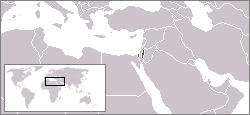This is an old revision of this page, as edited by Mirv (talk | contribs) at 07:20, 15 November 2004 (Reverted edits by 70.19.109.212 to last version by 68.218.114.68). The present address (URL) is a permanent link to this revision, which may differ significantly from the current revision.
Revision as of 07:20, 15 November 2004 by Mirv (talk | contribs) (Reverted edits by 70.19.109.212 to last version by 68.218.114.68)(diff) ← Previous revision | Latest revision (diff) | Newer revision → (diff)
| |||||
 Area initially claimed by State of Palestine | |||||
| Official language | Arabic | ||||
| Proclaimed Capital | Jerusalem | ||||
| Leader of the Palestinian Authority |
Yasser Arafat (disputed with Arafat's death) | ||||
| Prime Minister of the Palestinian Authority | Ahmed Qurei | ||||
| Area - West Bank - Gaza Strip |
not ranked 5,860 km² 360 km² | ||||
| Population - West Bank - Gaza Strip |
not ranked 2,020,298 (2000) 1,225,911 (2002) | ||||
| Declaration of Independence | 15 November 1988 | ||||
| Time zone | UTC +2/+3 | ||||
| National anthem | Biladi | ||||
| Internet TLD | .PS | ||||
| Calling Code | 970 | ||||
The State of Palestine was unilaterally proclaimed on November 15, 1988, by the Palestinian National Council, the legislative body of the PLO, in Tunis. At the time, the PLO did not have control over any part of Palestine (or any other territory), and therefore the State of Palestine did not fulfill one of the typical roles of a state - namely, occupying a territory. However, it laid claim to the whole of Palestine, as defined by the British Mandate of Palestine, rejecting the idea of partition.
The State of Palestine was recognized immediately by the Arab League and many other countries; currently, about 2/3 of the world's countries recognize it. It maintains embassies in these countries (which are generally Palestine Liberation Organization delegations.)
The State of Palestine is not recognized by the United Nations or by any Western country. However, some European Union countries (including the United Kingdom) maintain diplomatic ties with the Palestinian Authority, established under the auspices of the Oslo Accords.
The 2003 Road map for peace calls for a series of steps, each contingent on the previous steps, leading to the establishment of a Palestinian state. Included among these steps is dismantling of Palestintian terrorist groups by the Palestinian Authority. Additional steps are required of both Israel and the Palestinian Authority.
See Also
- Arab-Israeli conflict
- British Mandate of Palestine
- Hamas
- Islamic state in Palestine
- Israel
- Jewish state
- Palestine
- Palestinian Authority
- Palestinians
- Proposals for a Palestinian state
- PLO
- Palestine Liberation Army
- Occupation of the West Bank and East Jerusalem by Jordan
- Occupation of the Gaza Strip by Egypt